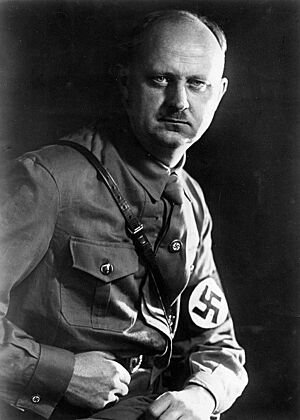Wilhelm Gustloff facts for kids
Quick facts for kids
Wilhelm Gustloff
|
|
|---|---|
 |
|
| Personal details | |
| Born | 30 January 1895 Schwerin, Grand Duchy of Mecklenburg-Schwerin, German Empire |
| Died | 4 February 1936 (aged 41) Davos, Switzerland |
| Nationality | |
| Occupation | head of the Swiss NSDAP/AO |
Wilhelm Gustloff (30 January 1895 – 4 February 1936) was the founder of the Swiss NSDAP/AO (the Nazi Party organisation for German citizens living outside Germany) at Davos. He led it from 1932 until his death.
In 1936, Gustloff was assassinated by David Frankfurter, a Croatian Jew outraged by the growth of the Nazi Party. After killing Gustloff, Frankfurter immediately surrendered and confessed, telling the police that "I fired the shots because I am a Jew."
Life and assassination
Gustloff was a son of merchant Herrmann Gustloff and his wife. After his education, he worked for the Swiss government as a meteorologist, and joined the NSDAP in 1927. He assisted in the distribution of the antisemitic propaganda book The Protocols of the Elders of Zion (1903). Members of the Swiss Jewish community sued the book's distributor, the Swiss NSDAP/AO, for libel.
Gustloff was shot and killed in Davos in 1936 by David Frankfurter, a Yugoslav Jewish student (from what is now Croatia), who was incensed by the growth of the NSDAP.
Frankfurter surrendered immediately to the Swiss police, confessing "I fired the shots because I am a Jew". He was convicted and sentenced to 18 years imprisonment.
He was incarcerated during the war years in a Swiss prison. On May 17, 1945 — shortly after V-E Day — Frankfurter was pardoned by a Swiss court.
Aftermath
Gustloff was given a state funeral in his birthplace of Schwerin in Mecklenburg, with Adolf Hitler, Joseph Goebbels, Hermann Göring, Heinrich Himmler, Martin Bormann and Joachim von Ribbentrop in attendance. Thousands of Hitler Youth members lined the route. His coffin, transported on a special train from Davos to Schwerin, made stops in Stuttgart, Würzburg, Erfurt, Halle, Magdeburg and Wittenberg. Gustloff's widow, mother and brother attended the funeral and received personal condolences from Hitler. Ernst Wilhelm Bohle was the first at Gustloff's funeral to recite a few lines in his honour.
Gustloff was proclaimed a Blutzeuge of the Nazi cause. His murder became part of the propaganda that served as pretext for the 1938 Kristallnacht pogrom. His wife Hedwig, who had been Hitler's secretary, received from Hitler personally a monthly "honorary pay" of 400 ℛℳ, the equivalent of some US$13,000 today.
Unlike the assassination of the German diplomat Ernst vom Rath by Herschel Grynszpan in Paris in 1938, Gustloff's death was not immediately politicized to incite Kristallnacht. Hitler did not want to risk any domestic bouts of antisemitism to cause Germany to lose the recently awarded right to host the 1936 Summer Olympics. His antisemitic policies had already led to some calls to relocate the games. Nevertheless, an editorial on the front page of Völkischer Beobachter demanded Frankfurter's execution.
Namesakes
The German cruise ship MV Wilhelm Gustloff was named for Gustloff by the Nazi regime. The ship was sunk by the Soviet submarine S-13 on 30 January 1945 (coincidentally the 50th anniversary of her namesake's birth) in the Baltic Sea while carrying civilian refugees and military personnel fleeing from the advancing Red Army. About 9,400 people died, the greatest death toll from the sinking of a single vessel in human history. The disaster remains relatively unknown.
In 1933 the Nazi Party created the Wilhelm-Gustloff-Stiftung ("The Wilhelm Gustloff Foundation"), a national corporation funded by properties and wealth confiscated from Jews. It ran the Gustloff Werke ("Gustloff Factories"), a group of businesses that had been confiscated from their Jewish owners or partners.
The small arms factory Berlin Suhler Waffen und Fahrzeugwerke was renamed Wilhelm Gustloff Werke in Gustloff's honour in 1939.

